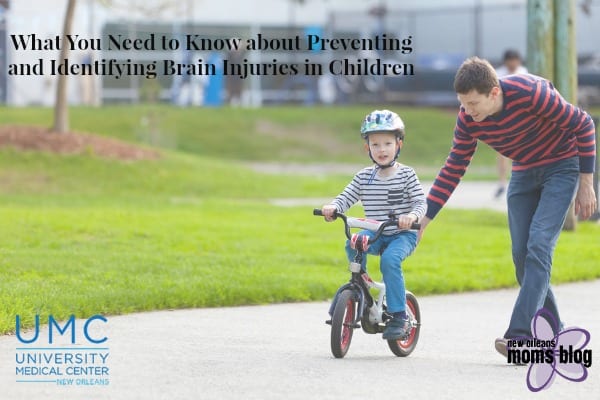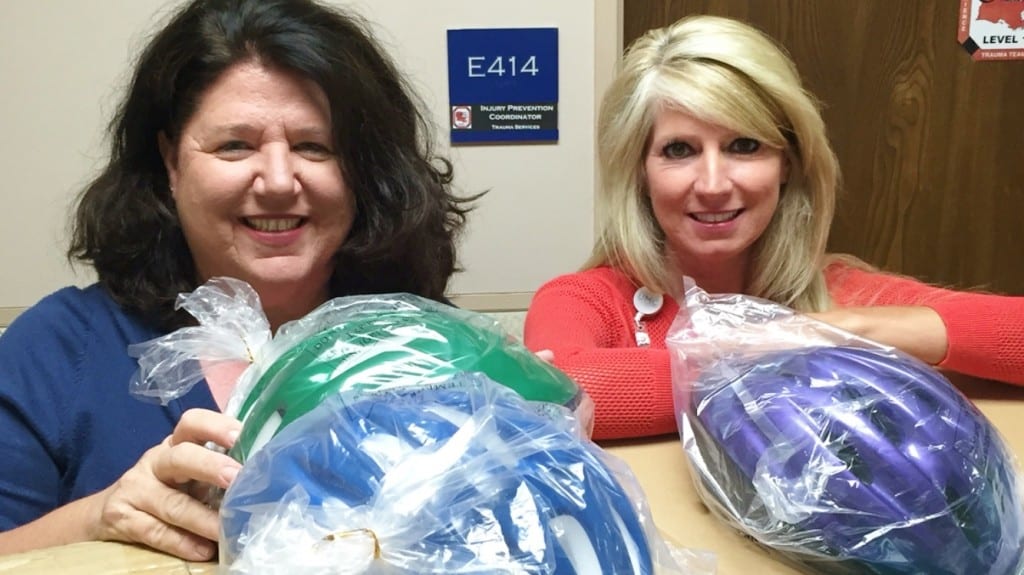What You Need to Know about Preventing and Identifying Brain Injuries in Children
Disclosure :: this post is sponsored by University Medical Center New Orleans.
Because we see far too many traumatic injuries in our Level 1 Trauma Center, University Medical Center New Orleans provides an injury prevention program to educate the community on preventing these type of injuries, especially brain injuries. March has been designated Brain Injury Awareness Month and specifically March 16, 2016 is Brain Injury Awareness Day. We want to take this opportunity to educate you on the risk factors, causes, signs and ways to prevent brain injury in children.
Why are children at risk?
Remember that age-old belief that brain injuries in children are less severe than in adults because the brain is still developing? Well, we now know that this is far from true. Cognitive impairment may not be obvious at first, but it can become apparent as the child grows and develops.
Head injuries are very common in children and adolescents. Most recent studies show that children’s skulls are 1/8 as strong as adults. Therefore, children are more vulnerable to injury through fractures of the skull which could injure the brain.
What are the most common causes of brain injuries in children?
• Motor vehicle crashes
• Falls from stairs
• Play areas
• Bicycles
• Scooters and skateboards
• Contact sports
What are the signs of a head injury in children?
• Tiredness or listlessness
• Irritability or crankiness (will not stop crying or cannot be consoled)
• Changes in eating (will not eat or nurse)
• Changes in sleep patterns
• Changes in the way the child plays
• Changes in performance at school
• Lack of interest in favorite toys or activities
• Loss of new skills, such as toilet training
• Loss of balance or unsteady walking
• Vomiting
Adolescents may also complain of a headache, blurred vision, fatigue and inability to remember.
What should you do if you suspect that your child has a brain injury?
Seek medical attention immediately. Early diagnosis and treatment provides the best outcomes to a brain injury.
How can you prevent your child from getting a brain injury?
All of the most common causes of brain injury listed above are preventable with the proper precautions:
• Use parks with age appropriate play equipment and play areas covered with soft material instead of concrete
• Always wear a helmet when riding a bike, scooter or skateboard
• Teach your child how and when to cross the street
• Lock up fire arms or teach your child to never touch a gun
• Wear approved helmets for all contact sports
• Always properly restrain your child in the correct car seat for his/her age, height and weight
Are you concerned about your car seat being properly installed?
Nationally certified child passenger safety technicians and instructors are available every Wednesday, 1-4 p.m. at Louisiana State Police Troop B in Kenner, LA. You can call 504-702-2295 for additional locations in the New Orleans area, as well as statewide locations. For additional information and updates, follow us on Facebook at Buckle Up Louisiana and University Medical Center New Orleans.
Learn more about our injury prevention program at UMCNO HERE.
About Bridget Gardner and Patricia Clesi, UMCNO Injury Prevention Program Coordinators
 Patricia (Patty) Clesi, RN, received her BSN from the University of South Alabama. She has worked as one of University Medical Center New Orleans’ Level 1 Trauma Center’s injury prevention program coordinators for the last 10 years. Patty leads the National Child Passenger Safety Technician courses which certifies technicians to provide one-on-one instructions to families about how to select the proper child restraint and ensure the restraint is correctly installed in their vehicles. Prior to her position in injury prevention, Patty worked in ICU where she saw many patients whose injuries were preventable. She finds the prevention side very rewarding. Patty resides in Metairie with her husband Bruce and nine-year-old son Thomas who loves riding skateboards and scooters, as well as many of the other activities mentioned in the blog.
Patricia (Patty) Clesi, RN, received her BSN from the University of South Alabama. She has worked as one of University Medical Center New Orleans’ Level 1 Trauma Center’s injury prevention program coordinators for the last 10 years. Patty leads the National Child Passenger Safety Technician courses which certifies technicians to provide one-on-one instructions to families about how to select the proper child restraint and ensure the restraint is correctly installed in their vehicles. Prior to her position in injury prevention, Patty worked in ICU where she saw many patients whose injuries were preventable. She finds the prevention side very rewarding. Patty resides in Metairie with her husband Bruce and nine-year-old son Thomas who loves riding skateboards and scooters, as well as many of the other activities mentioned in the blog.
Bridget Gardner, RN, has been a registered nurse for 24 years. She is a 1992 graduate of Charity Hospital School of Nursing who began her career in the Charity Hospital Trauma Center and has remained with the Level 1 Trauma Center through its transition to University Medical Center New Orleans. She is the Injury Prevention Program Coordinator for the Trauma Department and program director for the Louisiana Passenger Safety Task Force overseeing Occupant Protection activities in 9 regions of the state. She is the Louisiana Strategic Highway Safety Young Drivers Emphasis Area team leader and serves on the SHSP Implementation Team, Impaired Driving and Occupant Protection teams for the traffic safety blueprint of Louisiana. Guided by the late Dr. Norman McSwain, she has worked to bring tourniquet training to law enforcement statewide to increase survivability in active shooter events, motor vehicle crashes and traumatic injuries.
















